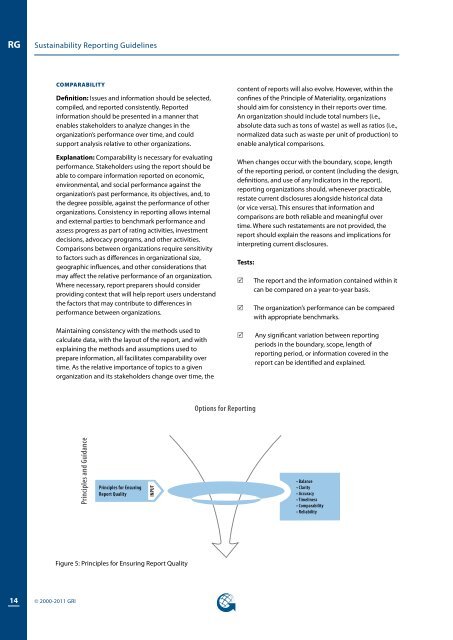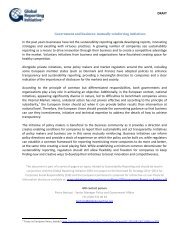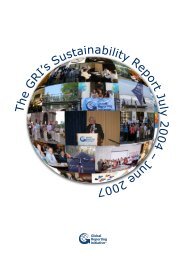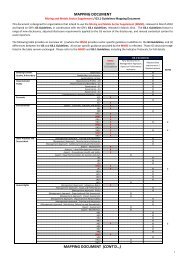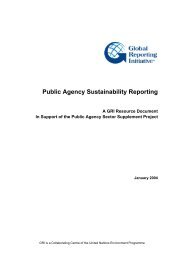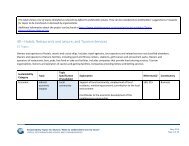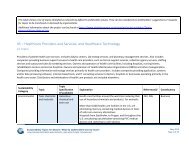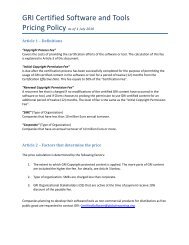G3.1 Sustainability Reporting Guidelines - Global Reporting Initiative
G3.1 Sustainability Reporting Guidelines - Global Reporting Initiative
G3.1 Sustainability Reporting Guidelines - Global Reporting Initiative
Create successful ePaper yourself
Turn your PDF publications into a flip-book with our unique Google optimized e-Paper software.
RG<br />
<strong>Sustainability</strong> <strong>Reporting</strong> <strong>Guidelines</strong><br />
Comparability<br />
Definition: Issues and information should be selected,<br />
compiled, and reported consistently. Reported<br />
information should be presented in a manner that<br />
enables stakeholders to analyze changes in the<br />
organization’s performance over time, and could<br />
support analysis relative to other organizations.<br />
Explanation: Comparability is necessary for evaluating<br />
performance. Stakeholders using the report should be<br />
able to compare information reported on economic,<br />
environmental, and social performance against the<br />
organization’s past performance, its objectives, and, to<br />
the degree possible, against the performance of other<br />
organizations. Consistency in reporting allows internal<br />
and external parties to benchmark performance and<br />
assess progress as part of rating activities, investment<br />
decisions, advocacy programs, and other activities.<br />
Comparisons between organizations require sensitivity<br />
to factors such as differences in organizational size,<br />
geographic influences, and other considerations that<br />
may affect the relative performance of an organization.<br />
Where necessary, report preparers should consider<br />
providing context that will help report users understand<br />
the factors that may contribute to differences in<br />
performance between organizations.<br />
content of reports will also evolve. However, within the<br />
confines of the Principle of Materiality, organizations<br />
should aim for consistency in their reports over time.<br />
An organization should include total numbers (i.e.,<br />
absolute data such as tons of waste) as well as ratios (i.e.,<br />
normalized data such as waste per unit of production) to<br />
enable analytical comparisons.<br />
When changes occur with the boundary, scope, length<br />
of the reporting period, or content (including the design,<br />
definitions, and use of any Indicators in the report),<br />
reporting organizations should, whenever practicable,<br />
restate current disclosures alongside historical data<br />
(or vice versa). This ensures that information and<br />
comparisons are both reliable and meaningful over<br />
time. Where such restatements are not provided, the<br />
report should explain the reasons and implications for<br />
interpreting current disclosures.<br />
Tests:<br />
R<br />
R<br />
The report and the information contained within it<br />
can be compared on a year-to-year basis.<br />
The organization’s performance can be compared<br />
with appropriate benchmarks.<br />
Maintaining consistency with the methods used to<br />
calculate data, with the layout of the report, and with<br />
explaining the methods and assumptions used to<br />
prepare information, all facilitates comparability over<br />
time. As Principles the relative importance for Ensuring of topics Report to a given Quality<br />
organization and its stakeholders change over time, the<br />
R<br />
Any significant variation between reporting<br />
periods in the boundary, scope, length of<br />
reporting period, or information covered in the<br />
report can be identified and explained.<br />
Options for <strong>Reporting</strong><br />
Principles and Guidance<br />
Principles for Ensuring<br />
Report Quality<br />
INPUT<br />
• Balance<br />
• Clarity<br />
• Accuracy<br />
• Timeliness<br />
• Comparability<br />
• Reliability<br />
Figure 5: Principles for Ensuring Report Quality<br />
14<br />
© 2000-2011 GRI


